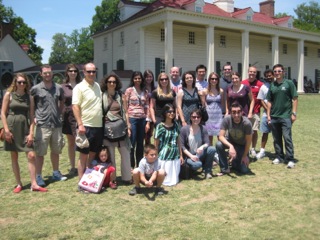11 March 2013
Scientists can tell stories well – with practice
Posted by mcadams

The 2012 American Meteorological Society's Summer Policy Colloquium attendees are seen on a visit to Mount Vernon in Virginia. Photo courtesy of Jennifer Henderson.
Blogger Jennifer Henderson, a PhD student in Science and Technology Studies at Virginia Tech, attended the American Meteorological Society’s Summer Policy Colloquium in 2012. Below is an adapted version of a post she wrote about the week-long event.
Communicating sciences to various publics has been on my mind for several years, but it was brought home to me last summer when I attended the American Meteorological Society’s annual Summer Policy Colloquium in Washington, D.C. I was one of a few social scientists to mingle with and learn from various atmospheric and meteorological scientists, ranging in experience from graduate school students to tenured professors and industry professionals.
While the colloquium centered on introducing attendees to several aspects of the policy world, which is rich in opportunities and complexity, the underlying theme, you might say, focused on encouraging scientists to think about their potential role in communicating what they do to different publics–policy makers, elected officials, students, and members of the general public.
As I listened to seasoned speakers from all walks of life, I gained a few unexpected insights into science policy and scientists themselves.
- Many scientists harbor the assumption that they’re not good at communicating their work. Not true! I heard many of my scientist colleagues refer to themselves as bad communicators, introverts, and pointy-headed thinkers. They insisted they didn’t know how to communicate (although they did have an inkling about how important it is that they do so). What I experienced instead was the opposite. Most of the participants were excellent story tellers and more than adequate communicators, they just hadn’t thought about the intersection of their narrative and research skills. With a little practice (and a lot of critique), many left the Colloquium more confident about their ability to explain not only their work but why it might be important to different audiences.
- Science affects policy and policy affects science. In fact, I would suggest that the two are intertwined in ways that make it difficult to distinguish them at times. Issues surrounding funding, regulation, and accountability shape the types of science we do and the ways in which it gets done. And then of course the types of science performed across the country affect and influence policy. See how they’re intertwined? There is no pure science nor is there pure policy. As they say in my discipline, Science and Technology Studies, they are co-constructed.
- There are multiple ways to participate in communicating sciences to your chosen public. With the help of communications staff members from the American Geophysical Union (AGU), we practiced distilling lengthy research agendas into a few sentences that could resonate with a listener. AGU staff encouraged us to think about the story of our research, the narrative hook that would capture someone’s interest; to practice talking about our research with school children, members of the media, even through social media sites; and to consider building a relationship with our local government officials, many of whom have little scientific background but must make decisions involving scientific information. (For a concise way of thinking about how scientists can act in multiple ways, read The Honest Broker, by Roger Pielke, Jr., or check out his awesome blog.)*
You, my friends, have the opportunity to join an amazing group of people at the American Meteorological Society who believe that the passion each of you feel about your work can be productively channeled into the science policy world…and beyond. The same elements of the universe that inspire you to pursue your research can inspire others. Your experience can give you a voice in shaping the multiple conversations among members of the public, policy makers, industry professionals, local government officials, and your fellow colleagues.
I wish I could attend again. The Colloquium opened up opportunities and allowed me to make connections I wouldn’t have had otherwise. It helped me understand the challenges of the political world and how these issues shape my own work. And it was so much fun!
The AMS Summer Policy Colloquium is now accepting applications for the next cohort who will meet in DC for nine days this June. But hurry, the deadline is March 31. If you’re a student or faculty member and you’re accepted, you can apply for NSF funding. So what have you got to lose?
*To read more about science policy, the AMS Colloquium, and how these two things have shaped my work and my colleagues’ work, please check out our article in the 19 February 2013 issue of Eos, the AGU’s monthly newspaper.
– Jennifer Henderson, PhD student in Science and Technology Studies at Virginia Tech


 The Plainspoken Scientist is the science communication blog of AGU’s Sharing Science program. With this blog, we wish to showcase creative and effective science communication via multiple mediums and modes.
The Plainspoken Scientist is the science communication blog of AGU’s Sharing Science program. With this blog, we wish to showcase creative and effective science communication via multiple mediums and modes.